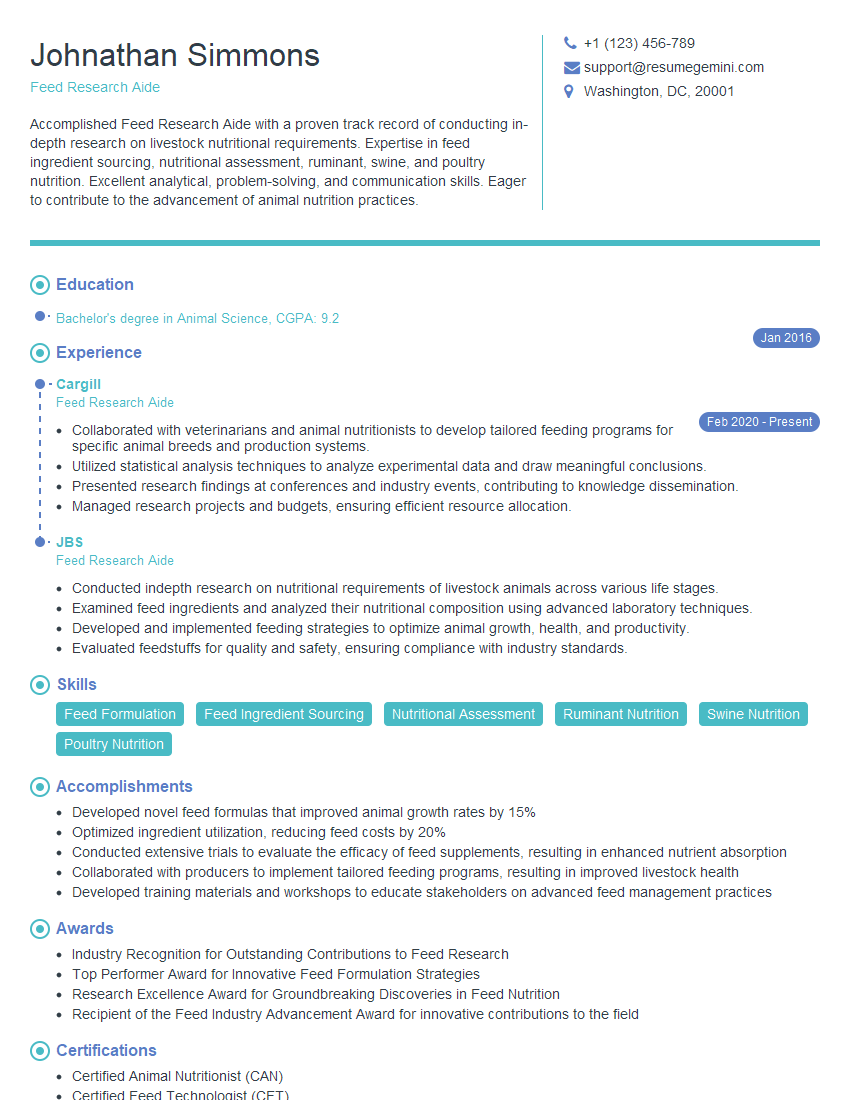Are you a seasoned Feed Research Aide seeking a new career path? Discover our professionally built Feed Research Aide Resume Template. This time-saving tool provides a solid foundation for your job search. Simply click “Edit Resume” to customize it with your unique experiences and achievements. Customize fonts and colors to match your personal style and increase your chances of landing your dream job. Explore more Resume Templates for additional options.

Johnathan Simmons
Feed Research Aide
Summary
Accomplished Feed Research Aide with a proven track record of conducting in-depth research on livestock nutritional requirements. Expertise in feed ingredient sourcing, nutritional assessment, ruminant, swine, and poultry nutrition. Excellent analytical, problem-solving, and communication skills. Eager to contribute to the advancement of animal nutrition practices.
Education
Bachelor’s degree in Animal Science
January 2016
Skills
- Feed Formulation
- Feed Ingredient Sourcing
- Nutritional Assessment
- Ruminant Nutrition
- Swine Nutrition
- Poultry Nutrition
Work Experience
Feed Research Aide
- Collaborated with veterinarians and animal nutritionists to develop tailored feeding programs for specific animal breeds and production systems.
- Utilized statistical analysis techniques to analyze experimental data and draw meaningful conclusions.
- Presented research findings at conferences and industry events, contributing to knowledge dissemination.
- Managed research projects and budgets, ensuring efficient resource allocation.
Feed Research Aide
- Conducted indepth research on nutritional requirements of livestock animals across various life stages.
- Examined feed ingredients and analyzed their nutritional composition using advanced laboratory techniques.
- Developed and implemented feeding strategies to optimize animal growth, health, and productivity.
- Evaluated feedstuffs for quality and safety, ensuring compliance with industry standards.
Accomplishments
- Developed novel feed formulas that improved animal growth rates by 15%
- Optimized ingredient utilization, reducing feed costs by 20%
- Conducted extensive trials to evaluate the efficacy of feed supplements, resulting in enhanced nutrient absorption
- Collaborated with producers to implement tailored feeding programs, resulting in improved livestock health
- Developed training materials and workshops to educate stakeholders on advanced feed management practices
Awards
- Industry Recognition for Outstanding Contributions to Feed Research
- Top Performer Award for Innovative Feed Formulation Strategies
- Research Excellence Award for Groundbreaking Discoveries in Feed Nutrition
- Recipient of the Feed Industry Advancement Award for innovative contributions to the field
Certificates
- Certified Animal Nutritionist (CAN)
- Certified Feed Technologist (CFT)
- Certified Feed Safety Expert (CFSE)
- Certified Livestock Feed Auditor (CLFA)
Career Expert Tips:
- Select the ideal resume template to showcase your professional experience effectively.
- Master the art of resume writing to highlight your unique qualifications and achievements.
- Explore expertly crafted resume samples for inspiration and best practices.
- Build your best resume for free this new year with ResumeGemini. Enjoy exclusive discounts on ATS optimized resume templates.
How To Write Resume For Feed Research Aide
- Highlight your research experience and expertise in animal nutrition.
- Quantify your accomplishments with specific metrics whenever possible.
- Demonstrate your knowledge of feed formulation, ingredient sourcing, and nutritional assessment techniques.
- Showcase your ability to collaborate effectively with cross-functional teams.
- Consider obtaining industry certifications or attending relevant workshops to enhance your credibility.
Essential Experience Highlights for a Strong Feed Research Aide Resume
- Conduct comprehensive research on the nutritional needs of livestock at various life stages.
- Examine feed ingredients and analyze their nutritional composition using advanced laboratory techniques.
- Develop and implement feeding strategies to optimize animal growth, health, and productivity.
- Collaborate with veterinarians and animal nutritionists to develop tailored feeding programs for different animal breeds and production systems.
- Utilize statistical analysis techniques to analyze experimental data and derive meaningful conclusions.
- Present research findings at conferences and industry events, sharing knowledge and insights.
- Manage research projects and budgets, ensuring efficient allocation of resources.
Frequently Asked Questions (FAQ’s) For Feed Research Aide
What are the primary responsibilities of a Feed Research Aide?
Feed Research Aides are responsible for conducting research on livestock nutritional requirements, analyzing feed ingredients, developing feeding strategies, collaborating with experts, and presenting findings to optimize animal growth, health, and productivity.
What qualifications are required to become a Feed Research Aide?
Typically, a Bachelor’s degree in Animal Science or a related field, along with experience in animal nutrition, feed formulation, and research methods, is required to qualify for this role.
What are the key skills needed to be successful in this role?
Strong analytical, problem-solving, and communication skills, coupled with expertise in feed formulation, nutritional assessment, and statistical analysis techniques, are essential for a Feed Research Aide.
What are the career prospects for a Feed Research Aide?
With experience and additional education, Feed Research Aides can advance to roles such as Animal Nutritionist, Feed Formulation Manager, or Research Scientist in the animal feed industry or academia.
What are the typical work environments for Feed Research Aides?
Feed Research Aides typically work in research laboratories, animal production facilities, or offices, conducting experiments, analyzing data, and collaborating with colleagues.
What is the expected salary range for Feed Research Aides?
The salary range for Feed Research Aides varies depending on experience, qualifications, and location, but generally falls within the range of $40,000 to $70,000 annually.
Are there any professional organizations or certifications for Feed Research Aides?
Yes, professional organizations like the American Society of Animal Science (ASAS) offer certifications and continuing education opportunities for individuals in the field of animal nutrition and feed research.